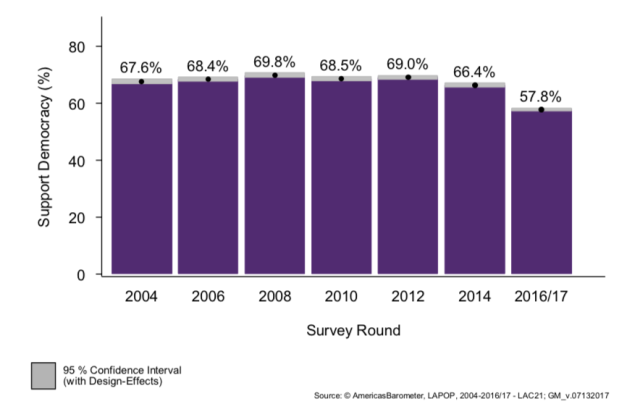The annual North Carolina Latin American Film Festival in Durham, NC begins next week on September 28 and runs through Wednesday, November 8.
North Carolina Latin American Film Festival (youtube clip)
The lineup of movies looks outstanding. Highly recommended.
Lineup:
NC LATIN AMERICAN FILM FESTIVAL 2017
TH. SEP. 28 | Pleasants Family Assembly Room. Wilson Library, UNC-CH. 5:00pm.
Maestra. Catherine Murphy (Cuba), 2012. 33min.
*Preceded by a reception.
SUN. OCT. 1 | RICHARD WHITE AUDITORIUM, Duke. 10:00am.
La Jaula de Oro / The Golden Dream. Diego Quemada Diez (Mexico, Guatemala), 2014/15. 90min.
*Preceded by a Brunch.
SUN. OCT. 1 | SILVERSPOT CINEMAS, Chapel Hill. 7:00pm (Ticketed event: please reserve HERE)
Tata Padrinos / Godparents. Dignicraft (Mexico-USA), 2017. 62min.
*Followed by a reception. *With presence of the filmmakers. Special event thanks to RTI Latino Diversity Group.
MON. OCT. 2 | RICHARD WHITE AUDITORIUM, Duke. 7:00pm.
Boi Neon / Neon Bull. Gabriel Mascaro (Brazil), 2015. 91min.
TU. OCT. 3 | CAROLINA THEATRE. 7:00pm.
Finding Oscar. Ryan Suffern (Guatemala/US), 2017. 90min.
WED. OCT. 4 | NELSON MANDELA AUDITORIUM, UNC-CH. 7:00pm.
El Aula Vacia | The Empty Classrom. Gael García Bernal, et all. (Mexico), 2015. 111min.
&
O custo da oportunidade | The Cost of Opportunity. Dudu de Morro & Stephanie Reist (Brazil), 2017. 30min.
*Preceded by a reception. With presence of the director The Cost of Opportunity.
TH. OCT. 5 | CAROLINA THEATRE, Durham. 7:00pm.
Short animations by Walter Tournier: Chatarra/Junk (2015) 5min; Alto el Juego/Cease the Game (2016) 6min.
El botón de nácar / The Pearl Button. Patricio Guzmán (Chile), 2016. 82min.
FRI. OCT. 6 | Frank Porter Graham Elementary, Chapel Hill. 7:00pm.
Children’s programming: animations by Walter Tournier, Uruguay.
Chatarra/Junk (2015) 5min; Alto el Juego/Cease the Game (2016) 6min.
Main program: Selkirk, el verdadero Robinson Crusoe | Pirates of the Seven Seas. Walter Tournier (Uruguay) 2012. 65min.
*Popcorn and beverages will be offered. *With presence of the filmmaker.
SAT. OCT. 7 | RICHARD WHITE AUDITORIUM, DUKE. 4:00pm.
Short animations by Walter Tournier: Chatarra/Junk (2015) 5min; Alto el Juego/Cease the Game (2016) 6min.
Sin nombre. Cary Fukonagua (Honduras, Mexico, USA), 2009. 96min.
&
SAT. OCT. 7 | RICHARD WHITE AUDITORIUM, DUKE. 7:00pm.
ARTEMIO. Sandra Luz López Barroso (México). 2017. 50min.
*With presence of the producer.
SUN. OCT. 8 | SILVERSPOT CINEMA, Chapel Hill. 7:00pm. (Ticketed event: please reserve: HERE)
Neruda, Pablo Larrain (Chile). 2016. 107min.
WED. OCT 25 | NELSON MANDELA AUDITORIUM, UNC-CH. 7:00pm.
Tempestad | Tempest. Tatiana Huezo (Mexico), 2016. 105min.
WED. NOV 1 | LOVE AUDITORIUM, DUKE. 7:00pm.
Salero. Mike Plunket (Boliva) 2016. 116min.
&
Narrating Nature (three Shorts)
TH. NOV 2 | NELSON MANDELA AUDITORIUM, UNC-CH. 7:00pm.
El Acompañante | The Companion. Pavel Giroud (Cuba), 2016. 104min.
WED. NOV. 8 | NELSON MANDELA AUDITORIUM, UNC-CH. 7:00pm.
Truman. Cesc Gay (Argentina, Spain), 2015. 108min.
